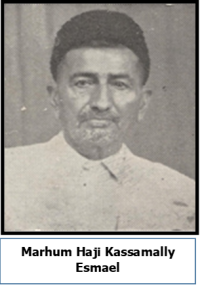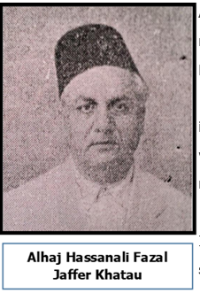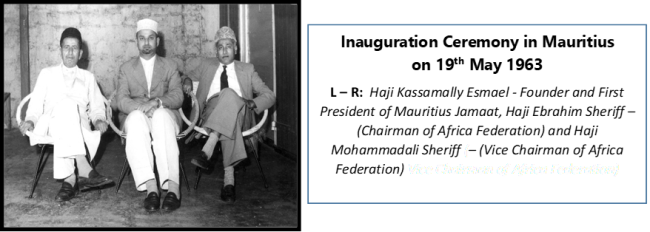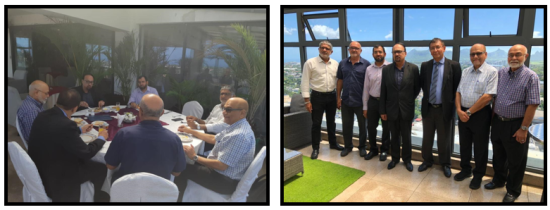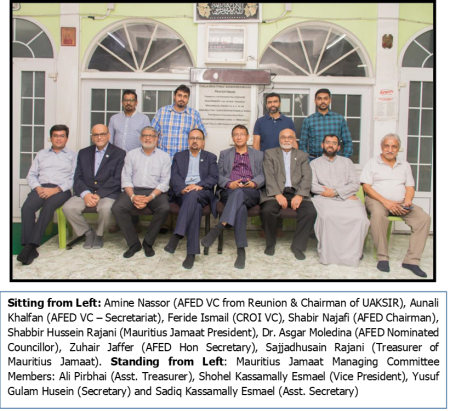Mauritius
Contents
Mauritius: A Journey Through Time - From Early Pioneers to a Flourishing Community
In the 1890s, the Ithna-Asheris were part of the early wave of Indian migrants to Mauritius. Among these pioneers were individuals like Visram Ebrahim from Cutch, Rashid Alidina from Cutch (a prominent sugar merchant in Mumbai), Hirji Khakoo (father of Peera Hirji from Zanzibar), Janmohamed Datoo of Cutch, Ratansi, and Mohamed Dossa Khakuwani of Bhuj. Additionally, Allarkhia Dewji of Cutch, formerly partnered with Karim Lalji Sajan in Mumbai, joined this group.
However, following the severe economic downturn that followed the First World War in 1914, nearly all of the initial settlers chose to return to India, except for Ratansi and Mohamed Dossa. These two members remained in Mauritius and eventually passed away, with their resting place being the general Muslim cemetery.
The first President of Mauritius Jamat
The roots of the Mauritius Jamaat can be traced back to the 1920s. The family of the late Kassamally Esmael is believed to have been one of the earliest known Ithna Asheri families in Mauritius with religious gatherings taking place at the home of the late Haji Mulla Kassamally Esmael. He not only hosted these gatherings but also recited majalis for the small Ithna Asheri community that existed at that time. During Muharram, these majalis and events often drew attendance even from non-Shias, indicating their significance. [Marhum Haji Kassamally Esmael Ebrahim Dossa]], born in Mumbai in 1890, received primary education at Khan Habib School in Gujarat. At the time, the religious education such as Qur’an was being undertaken by Mulla Qader Hussayn Saheb.
Initially residing in Mumbai, Marhum Haji Kassamally Esmael embarked on a sea voyage aboard the "Hussayni" steamer of the Moghul line in 1907, ultimately reaching Mauritius. He spent two years working for a Memon businessman before venturing into a career as a broker/agent in the "Kariyana" (Foodstuff) trade. In 1910, he briefly returned to Mumbai but returned to Mauritius in 1911. There, he married and continued his work as a broker until 1930 when he took the bold step of establishing his own successful business in the Kariyana Food Stuff sector. In 1920, Marhum Haji Kassamally Esmael, accompanied by his wife, son, and daughter, made a trip to Mumbai. During this visit, his wife gave birth to a baby girl. Tragically, this infant passed away when she was only 8 months old. In 1921, Marhum Haji Kassamally Esmael, along with his wife and children, returned to Mauritius. During their stay in Mauritius, they were blessed with the arrival of four more daughters and five sons. Throughout his lifetime, Marhum Haji Kassamally Esmael exhibited unwavering dedication and diligence in serving the community. His home served as a central hub for all religious activities, accentuating his profound commitment to the welfare and well-being of the community.
Growth of Jamaat Membership
As the Jamaat's membership continued to grow, one noteworthy individual who arrived in Mauritius was Hassanali Fazal Jaffer Khatau. Born on September 23, 1908, in Mukalla, Yemen, he received his early education in India. At the age of 17, he commenced his career working for Haji Lalji in Mukalla before eventually relocating to the Aden branch. In 1933, he returned to India for his wedding and subsequently joined Abdulrahman Osman, a Memon company, in 1934. His journey then led him to Mauritius, where he assumed the responsibility of managing their branch. After a brief interlude in India, he returned to Mauritius in July 1938. In 1941, he took a significant step by establishing his own business, which progressively thrived over the years. With the continuous increase in membership, the Mauritius Jamaat was officially established on June 17, 1960. During the inaugural elections, Marhum Haji Kassamally Esmael was elected as the first president of the Mauritius Jamaat, and Alhaj Hassanali Khatau was unanimously chosen as the Honorary Treasurer. In the early 1960s, the Ithna Asheri community in Mauritius achieved a significant milestone with the acquisition of a prime plot of land in the city center of Port Louis. This endeavor was made possible through the generous support of the of the Africa Federation. On this land, the construction of the Khoja Ithna Asheri Mosque commenced which received crucial cooperation and assistance from Africa Federation, notably from the Chairman at the time, Marhum Haji Ebrahim Husein Sheriff Dewji, and the Vice Chairman, Marhum Mohammedali Sheriff Jiwa. The unwavering dedication and financial contributions of the faithful members played a vital role in the successful completion of the present-day main structure of our Imambargha in 1963.
Construction of Musafar Khana
In 1974, the construction of the Musafar Khana was initiated to provide accommodation for those Momineen who traveled to Mauritius. The following year, a building was constructed to house the Resident Aalim and Madrassah, a project undertaken in memory of Late Hasanali Pirbhai. During the same year, a new hall on the top floor of the Imambargha was constructed for ladies, now commonly known as Mehfil-e-Zainabia. The construction of this Mehfil was dedicated to the memory of Late Kassamally Esmael, with a financial contribution from Haiderbali Bhai Pirbhai.
Currently, the President of the Jamaat is Alhaj Shabbir Hussein Rajani, who assumed office in April 2019. The Jamaat is widely recognized for its vibrant and active functioning. Its facilities include the Mosque, the ladies' Imambargha, the Madrassah, the Musafirkhana - all conveniently located in one functional area, while the Kabrastan is situated a few kilometers away. These properties occupy prime locations within the city.
Member of CROI
In the year 2000, the KSI Jamaat of Mauritius took a significant step by becoming a member of the Conseil Régional Des Khojas Shia Ithna-Asheri Jamates De L’Ocean Indien (CROI). This membership was formalized following the visit to Mauritius by the late Chairman of the Africa Federation, Alhaj Zulfikar Khimji, and the former President of the World Federation, Dr. Ahmed Hassam. Alhaj Mojiz Raza Khamis represented CROI during this process. The primary objective behind this association was to foster collaboration, cooperation, unity, and progress for the collective benefit of all Jamaat members in the Indian Ocean Islands of Africa, guided by the spirit of broader brotherhood.
Highlighting the commitment to this vision, a distinguished delegation from the Africa Federation visited the Jamaat in Port Louis, Mauritius, from February 4th to 5th, 2020. The delegation included the officials at that time: Alhaj Shabir Najafi, Chairman; Alhaj Aunali Khalfan, Vice Chairman; Alhaj Amine Nassor, Chairman of UAKSIR and Vice Chairman of AFED from Reunion; Alhaj Zuhair Jaffer, Hon. Secretary; Alhaj Feride Ismail, CROI Vice Chairman; and AFED Nominated Councillor Dr Asgarali Moledina. Their presence solidified the commitment to the shared goals of unity, collaboration, and progress within the community, further strengthening the bonds of brotherhood in the region.
Memories of the Meeting between AFED and Mauritius Jamaat officials in February 2020:
- Let us remember with Sura-e-Fateha the past leaders and the Marhumeen of Mauritius Jamaat and all esteemed personalities who are no more in this transient world and who served the community in different capacities dedicating their valuable time, efforts and resources for the pleasure of Allah (SWT) and provided services to the community at large.
SECRETARIAT
ARCHIVES SECTION OF AFRICA FEDERATION
Date: 24th September 2023 (8th Rabiul Awwal 1445 A.H.)
